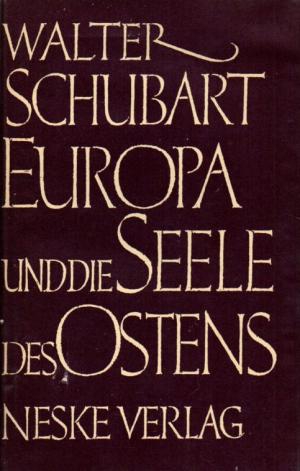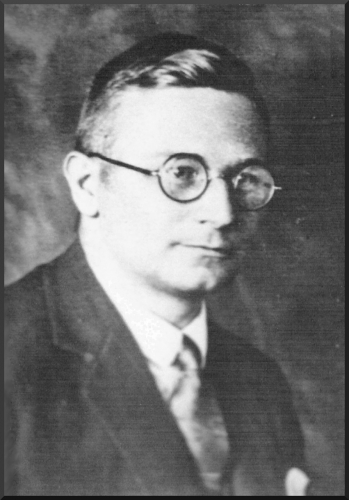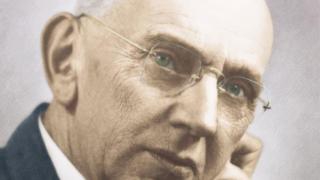vendredi, 01 septembre 2017
Walter Schubart’s Messianic-Promethean Synthesis
Walter Schubart’s Messianic-Promethean Synthesis
Ex: http://www.geopolitica.ru
Oswald Spengler, the philosopher-historian who gave the modern West an empirical theory for the traditional outlook of history as organic, on studying civilizations over millennia, warned Western Civilization that it was on its downward cycle of decay and death, and would after a last hurrah on the world stage, sink into cultural and historical oblivion. This final and permanent stagnation, when history would end for Western Civilisation like it had for others, he called fellaheen, after the Arabic word for those who till the soil. While the soil is where the healthy organism germinates at its beginning, it is also where it ends, when Civilization collapses, and returns to its primal origins from whence it does not re-emerge. (Oswald Spengler, The Decline of The West, London: Allen and Unwin, 1972).
That Western Civilization has indeed embarked on a prolonged cycle of decay into death can only be rejected by the ignorant such as those who overpopulate academia, who are too befuddled by the West’s technology and ability to impose democracy over the world with a combination of bombs and moral degeneracy, to see what is unfolding before the eyes of anyone who does not live a mentally and/or physically closeted existence.
 Like the optimism of the Victorians (or at least the strata that did not live in squalor) during the Industrial Revolution, with their Darwinism, the West is supposedly continuing to march forward in progress as the epitome of human ascent, toward which all that has gone before was merely a prelude. In this scenario, we are about to enter a dispensation that will “end history,” as Professor Francis Fukuyama put it, (F. Fukuyama, “The End of History?,” The National Interest, Summer 1989, http://www.wesjones.com/eoh.htm) having achieved all that there is to achieve with the universal triumph of liberal-democracy. Those such as Fukuyama and Amercian millenialists such as Colonel Ralph Peters, (R. Peters, “Constant Conflict,” Parameters, U. S. Army War College, Summer 1997, http://ssi.armywarcollege.edu/pubs/parameters/Articles/97...) and fellow “neocon” ideologues such as Michael Ledeen (M. Ledeen, “Dishonorable Congressman,” National Review, 10 September 2003, http://www.nationalreview.com/article/207982/dishonorable...) see life eternal, where detached realists see for the Western Civilisation death, and the Western organism as a zombified rotting corpse animated by technology and money, infecting all it touches with a cultural syphilis that those such as Colonel Peters actually applaud as wonderfully “toxic” to whatever remains in the world of traditional cultures. (R. Peters, op. cit.).
Like the optimism of the Victorians (or at least the strata that did not live in squalor) during the Industrial Revolution, with their Darwinism, the West is supposedly continuing to march forward in progress as the epitome of human ascent, toward which all that has gone before was merely a prelude. In this scenario, we are about to enter a dispensation that will “end history,” as Professor Francis Fukuyama put it, (F. Fukuyama, “The End of History?,” The National Interest, Summer 1989, http://www.wesjones.com/eoh.htm) having achieved all that there is to achieve with the universal triumph of liberal-democracy. Those such as Fukuyama and Amercian millenialists such as Colonel Ralph Peters, (R. Peters, “Constant Conflict,” Parameters, U. S. Army War College, Summer 1997, http://ssi.armywarcollege.edu/pubs/parameters/Articles/97...) and fellow “neocon” ideologues such as Michael Ledeen (M. Ledeen, “Dishonorable Congressman,” National Review, 10 September 2003, http://www.nationalreview.com/article/207982/dishonorable...) see life eternal, where detached realists see for the Western Civilisation death, and the Western organism as a zombified rotting corpse animated by technology and money, infecting all it touches with a cultural syphilis that those such as Colonel Peters actually applaud as wonderfully “toxic” to whatever remains in the world of traditional cultures. (R. Peters, op. cit.).Even if the USA is, as the centre of contagion, beyond remedy, must Europe exhaust its possibilities and succumb to fellaheen level? Organic relationships can be symbiotic and complementary (Lev Gumilev, Ethnogenesis and the Biosphere, http://gumilevica.kulichki.net/English/ebe2a.htm) or amalgamate through synthesis. They need not be parasitic, distorting, or retarding in regard to a culture-organism’s life cycle. That is how, if we accept at least broadly the work of Russian ethnologist Lev Gumilev, new ethnoi and super-ethnoi are formed (Ibid.). Like any mixture, it depends on the qualities and circumstances of what is being mixed as to whether the consequences will be invigorating or pathogenic. A blood transfusion of compatible types might save a life, but will sicken or kill if the blood types are incompatible. A virus can create a vaccine, or it can cause sickness and death, depending on the amount and transformation of the virus.
Dr. Walter Schubart, a Baltic-German convert to Orthodoxy, married to a Russian, widely known as an authority on Russia prior to World War II, reaching a similar historical-philosophy to Spengler’s, proposed the synthesis of the “Promethean” (what Spengler called “Faustian”) Westerner and the messianic Russian, each complementing the other. (Schubart was professor of sociology and philosophy at the Latvian State University. Dismissed by the Germans in 1941, he was thought to have died in a Soviet prison camp).
Even Spengler, despite his suspicion of Bolshevik Russia as leading a “coloured revolution against the white world,” (Spengler, The Hour of Decision, New York: Alfred A Knopf, 1963) also foresaw other possibilities for Russia, even under Bolshevism, as early as 1922 (Spengler, “The Two Faces of Russia and Germany’s Eastern Problems,” Politische Schriften, Munich, 14 February, 1922). He foresaw that Bolshevism would probably become Russianized, divest itself of Marxist doctrine, and develop into a Slavic authoritarian state, with which Germany could work in alliance against the Western liberal plutocracies. This at least was the policy pursued by Walter Rathenau, German foreign minister, with the Treaty of Rapallo, and a Russo-German alliance was sought by the most conservative of Germany’s military and political elite, regardless of any Marxian façade maintained by Russia.
Of the two types, Promethean and Messianic, Schubart wrote that “Messianic man” “longs to bring the discordant external world to harmony with the image that he carries within him.” “He does not love the world for itself but only so that he can build within it the Kingdom of God”. The world is “raw material for his mission.” “Messianic man” seeks reconciliation; unity. (W. Schubart, Russia and Western Man ([1938] New York: Frederick Ungar, 1950), 72-73). The Kingdom of God must be realised on earth. (Ibid., 74).The Gothic Westerner had a messianic impulse with his Crusades not only to secure the Holy Land from the Moor, but to make Jerusalem the centre of the Kingdom of God.
The contrast now between the West and Russia is that “Promethean” (Faustian) man seeks only to exploit and rule the earth, (Ibid., 80) which Spengler saw as the final epoch of the Late West’s domination by the machine. (Spengler, The Decline…, XIV, “The Form-World of Economic Life (B) The Machine,” Vol. II, 499-507). The Westerner seeks as an end goal “middle class comfort.” The Russian is impelled to sacrifice “in a final dramatic scene.” (Schubart, 80). The Russian is the collective Katehon, holding back the Antichrist. The West has become the Antichrist. The Russian is a martyr. He accepts his fate Christ-like. Rather than submit to Napoleon, the Russians set their Holy City, Moscow, ablaze. The sight forever affected Napoleon. (Ibid., 83-84).
The Russian mission is to liberate the world from the contagion of the Late West, or to liberate Europe from its own terminal Western hubris; to “redeem” the West or to “replace it.” (Ibid., 191). This sense of mission has long been conscious among Russian thinkers and holy men. In 1852, seventy years before Spengler, Ivan Kireyevsky, the Slavophil philosopher, wrote of the decline of the West: “The spiritual development of Europe has already passed in zenith. In atheism and materialism it exhausted the only powers at its disposal – those of abstract rationalism – and now it is approaching bankruptcy.” (Quoted by Schubart, ibid.).

Schubart cited ethnologist and philosopher-historian Nikolay Danilevski’s Russia and Europe (1871) as anticipating Spengler on organic culture cycles, in which the replacement of the West by Russia as the next world-civilisation was part of the ongoing cyclic historical process. (Ibid., 192). Danilevski had also critiqued the Westernisation of Russia by Peter as ill-fated. Foreshadowing Spengler, Danilevski’s culture epochs are those of youth, adulthood, and old age. He saw the Slavic as being in the youth phase, and that with its capital in Constantinople, the Slavic would be considered by a decaying world as its redeemer.
With the revival of “Eurasianism,” and Dr. Alexander Dugin’s blueprint for a multipolar world against Amercian globalization, achieving influence among the highest echelons of Russian politics and scholarship, the vision of Danilevski and the 19th century Slavophils, and Spengler’s prescience on a post-Western Russian world-civilisation are being actualized. Konstantin N. Leontiev at about the time of Danilevski advanced the idea of “the law of cyclicity of historical development.” Lev Gumilev’s cyclic-ethnology has a great deal of influence in present-day Russia. (Mark Bassin, The Gumilev Mystique, Cornell University Press, 2016). Russia has therefore had a long tradition of scholarship on culture-morphology.
Schubart believed there was after the crisis of World War I a revival of religion in the West. Spengler also stated that during the epochal crisis of a Late civilisation there is a “second religiousness” (Spengler, The Decline…, Vol. II, 455). Materialism, secularism, rationalism and scientism, do not satisfy an innate religious yearning, and themselves must assume religious forms. Note how zealous atheists and Darwinists are in defending their faith. Now there are a proliferation of cults and religions throughout the West, symptomatic of existential crisis, of a yearning for a return to the nexus with the divine that is lost in the “Winter” epoch. If the spiritual chaos that marks a culture in decay takes form as a “second religiousness” in the Spenglerian sense, then perhaps Schubart’s aborted hope of a re-spiritualised West as the prelude to a Russian symbiosis will eventuate. At the time Schubart saw Western man “approaching closer to the spirit” of Russia. “While the night of decline is descending upon Western culture, which is destined to perish, the dawn of the Millennium is coloring the distant horizon…” (Schubart, 284). “The approaching collapse of Western culture is unavoidable, and we may even ask ourselves whether it would be desirable to avoid it.” (Ibid., 293).
Neither Spengler nor Schubart believed it organically possible to return the West to a “Spring” epoch, any more than it is possible for a geriatric to return to youth, despite whatever cosmetic and medicinal efforts are made.
What Schubart did hope for was a chastising of the Late West’s hubris, which we see in our collapsing societies, and existential angst, that would lead to the liberation of religious feeling without which “no new creation can become possible.” (Ibid., 293). In this “apocalyptic age” Schubart saw the promise of “new life,” while in Russia a new type emerges that is transforming what is of value in Western culture, without being retarded or distorted by it, despite the conscious efforts of inner and outer enemies. “This new type, while truly Russian, is yet heir to the eternal values of the West.” (Ibid., 295). “For although the Russian of today is not yet the Man of the Millennium, yet it is he – and only he – who will succeed in evolving him; the Russian will purify himself until he has attained the height of development necessary to produce him.” (Ibid., 295).
Schubart wrote that “The spiritual Russian needs practical qualities; the practical European is in need of a new humanity.” Schubart called it a “synthesis.” (Ibid., 297). The remaining option is for the Late West to continue as an animated zombie at the call of the USA, as a carrier of culture-pathogens.
“A new Apocalypse is approaching with a Last Judgement – and a Resurrection! Promethean man already bears upon his brow the sign of Death. Now let the Man of the Millennium be born!” (Ibid., 300).
19:54 Publié dans Philosophie, Révolution conservatrice | Lien permanent | Commentaires (0) | Tags : walter schubart, allemagne, russie, révolution conservatrice, philosophie, anthropologie |  |
|  del.icio.us |
del.icio.us |  |
|  Digg |
Digg | ![]() Facebook
Facebook




Les commentaires sont fermés.